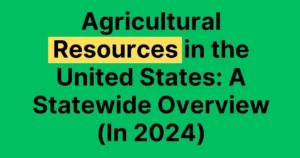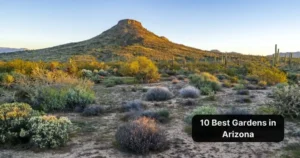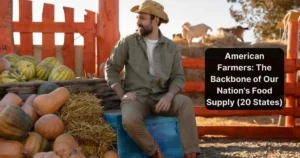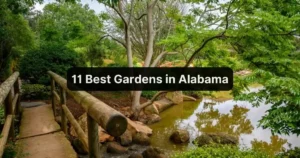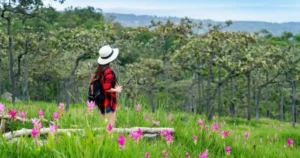Hi everyone! Hasan here, your friendly neighborhood home garden hobbyist.
I’ve been growing my veggies and flowers for about 7 or 8 years now.
I wish I had known sooner about the free expert advice offered by Cooperative Extension Services (CES).
Whether you’re planting your first seeds or managing a flourishing garden, these services can help you succeed.
Let me tell you a little story. When I first started gardening, I had no idea what “companion planting” was.
After a few frustrating seasons, I learned that some plants thrive when grown next to each other, while others don’t.
The Cooperative Extension’s companion planting chart completely transformed my approach to planting—and I haven’t looked back since.
Table of Contents
What is a Cooperative Extension Service?
Think of Cooperative Extension Services as your go-to team of local experts.
These services are affiliated with land-grant universities, and they specialize in providing research-backed advice on agriculture, gardening, and even household management.
The cool part?
These services are available to everyone and typically at no cost.
Why Should You Use Your Local Cooperative Extension?
When I struggled with aphids in my garden, my CES agent recommended the perfect natural predator: ladybugs.
Not only did this save my roses, but it also taught me the value of seeking professional advice.
Here are a few reasons why tapping into these resources makes a world of difference:
- Localized Expertise: They understand your region’s climate, soil, and growing conditions.
- Tailored Solutions: Whether you’re growing tomatoes in Kansas or marigolds in Florida, they’ve got tips just for you.
- Access to Workshops and Materials: Many extension services offer free or low-cost gardening workshops, guides, and charts that simplify complex gardening tasks.
Real-Life Example: The Importance of Mulching
Take mulch, for example.
Early on, I didn’t use mulch properly.
My soil dried out, and my plants suffered.
After a chat with a CES expert, I learned how a good mulch layer helps retain moisture and suppress weeds.
Simple tips like this have made all the difference in my garden’s success.
Companion Planting: A Game-Changer for Your Garden
Understanding which plants love or hate each other can elevate your gardening game.
For example, tomatoes thrive next to basil but hate cucumbers.
This is something I learned after years of trial and error.
But you don’t need to guess—just ask your local extension agent for a companion planting guide, or better yet, check out my chart on the subject!
How to Access Cooperative Extension Services
Curious about how you can access these services?
Each state has its own Cooperative Extension Service, often connected to universities.
Whether you’re in Alabama, Alaska, or Puerto Rico, these resources are available near you.
A quick call or visit to your local extension office can lead to a world of gardening insights you won’t find anywhere else.
Cooperative Extensions in the U.S. Territories
51 Cooperative Extension Services
- Alabama (Alabama A&M University, Auburn University, Tuskegee University)
- Alaska (University of Alaska Fairbanks)
- Arizona (Diné College, University of Arizona)
- Arkansas (University of Arkansas, University of Arkansas at Pine Bluff)
- California
- Colorado
- Connecticut
- Delaware (Delaware State University, University of Delaware)
- District of Columbia
- Florida (Florida A&M University, University of Florida)
- Georgia (Fort Valley State University, University of Georgia)
- Hawaii
- Idaho
- Illinois
- Indiana
- Iowa
- Kansas (Haskell Indian Nations University, Kansas State University)
- Kentucky (Kentucky State University, University of Kentucky)
- Louisiana (Louisiana State University, Southern University and A&M College)
- Maine
- Maryland (University of Maryland, University of Maryland Eastern Shore)
- Massachusetts
- Michigan (Bay Mills Community College, Michigan State University, Saginaw Chippewa Tribal College)
- Minnesota (Leech Lake Tribal College, Red Lake Nation College, University of Minnesota)
- Mississippi (Alcorn State University, Mississippi State University)
- Missouri (Lincoln University, University of Missouri)
- Montana (Chief Dull Knife College, Aaniiih Nakoda College, Fort Peck Community College, Montana State University, Salish Kootenai College)
- Nebraska (Little Priest Tribal College, Nebraska Indian Community College, University of Nebraska)
- Nevada
- New Hampshire
- New Jersey
- New Mexico (Institute of American Indian and Alaska Native Culture and Arts Development, New Mexico State University)
- New York
- North Carolina (North Carolina A&T State University, North Carolina State University)
- North Dakota (Fort Berthold Community College, Cankdeska Cikana Community College, North Dakota State University, Sitting Bull College)
- Ohio (Central State University, Ohio State University)
- Oklahoma (Langston University, Oklahoma State University)
- Oregon
- Pennsylvania
- Rhode Island
- South Carolina (Clemson University, South Carolina State University)
- South Dakota (Sisseton Wahpeton College, South Dakota State University)
- Tennessee (Tennessee State University, University of Tennessee)
- Texas (Prairie View A&M University, Texas A&M University)
- Utah
- Vermont
- Virginia (Virginia Tech, Virginia State University)
- Washington (Northwest Indian College, Washington State University)
- West Virginia (West Virginia State University, West Virginia University)
- Wisconsin (College of Menominee Nation, Lac Courte Oreilles Ojibwa Community College, University of Wisconsin)
- Wyoming
Close
Now that you’ve learned the value of Cooperative Extension Services, imagine the possibilities for your garden.
Whether you need help with planting schedules, pest control, or even soil testing, these local experts are ready to assist you.
Gardening is a journey, and having CES on your side can make it even more fruitful.
If you’re serious about improving your garden, don’t hesitate to reach out to your local extension service today and start planting with confidence.
Also, check out my companion planting chart for a head start.
Happy gardening!

